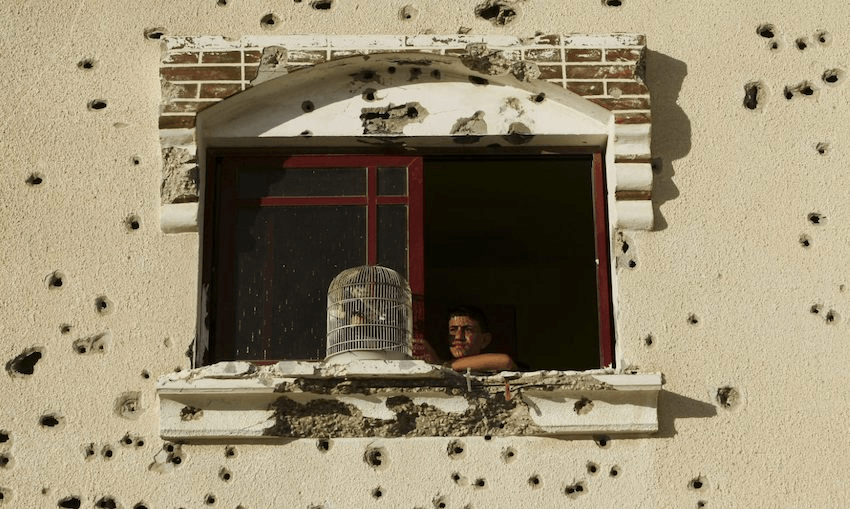To mark International Day of Peace, Dr Rebecca Dudley of the New Zealand Red Cross explores the role that New Zealanders play in the global story of war and peace.
Personal stories about war almost always begin with a memory.
A humid afternoon in South Sudan.
A calm Wednesday evening in Beirut.
A bustling shopping strip in Afghanistan.
On 21 September we mark the International Day of Peace, an appropriate day to reflect on the human impacts of war. This year we also mark 70 years since the Geneva Conventions, the international laws that seek to promote humanity, even in the most inhuman circumstances.
It’s human stories, people and their needs, that are at the centre of the laws of war in the Geneva Conventions. They highlight the crucial connection between humanitarian law – the rules that we set, and humanitarian action – what we do.
These conventions are not empty words. They protect the safety, dignity and wellbeing of civilians during armed conflict including women and children, the elderly, injured and ill, people with disabilities and detainees. Every day, these laws work – often worlds away from public awareness – to protect innocent people. A wounded person is allowed through a checkpoint, a child facing famine receives food, detained people are able to send messages to their families.
But when these laws are not respected, there can be devastating humanitarian consequences.
Last month, prime minister Jacinda Ardern hosted an event at parliament to mark the anniversary of these Geneva Conventions. Seventy years on we heard how these laws work and how they could work better. At the event, organised by the Red Cross, speakers shared their experience of the law at work.
Red Cross nurse Felicity Gapes spoke of working with young men from a widely feared armed group in South Sudan. She and her team educated these men on the rules of war by reminding them of the fighting games they played as children.
Judge Advocate General Kevin Riordan recounted tough meetings in the early 1990s in Bosnia and Herzegovina. “Some of these individuals subsequently stood in the dock for war crimes,” he said. “But to get anywhere in our mission we had to deal with these people. How do you convince a person who has broken perhaps two thirds of the laws of war to comply with international law? The only way I know how is to persistently advocate the value of doing so.”
Red Cross youth activator Sakhr Munassar described the streets and buildings where he grew up and played football in Yemen. “When I think of Yemen from my childhood… I remember buildings and cities that defined the origins of Arabia, some standing tall for 3000 years. I used to look at the sky every time I heard a plane with a sense of wonder.”
Sakhr described the relentless destruction of his home. He said children now run in fear every time they hear a plane.
Saba Afrasyabi described growing up in a family that was displaced by the conflict in Afghanistan to Pakistan, feeling excluded. “We were not allowed identification, which restricted us from most things,” she said of her time in Pakistan.
We may be geographically remote, but New Zealand has played a role in all these stories. Kiwis have been soldiers and aid workers providing humanitarian assistance in places of conflict, and former refugees forced to flee their home. And Kiwi politicians, diplomats and lawyers have played leading roles in international negotiations to develop the laws that protect the most vulnerable people in conflict.
Our Pacific neighbours are also an important part of this story. Though not characterised by widespread conflict now, many Pacific nations are also familiar with war. Combat on Pacific islands in World War Two and strafing and bombing raids left many island landscapes unrecognisable. Tens of thousands of people were displaced, missing and unaccounted for due to air and maritime bombardments. Thousands more died in shipwrecks as a result of armed conflict. In nine Pacific countries, munitions and other physical remnants of war remain.
Over recent decades, nuclear testing in the Pacific has inflicted a lasting human and environmental impact. Arms transfers are also sometimes able to proceed undetected across this vast ocean continent.
Several countries in the Pacific regularly send peacekeepers and humanitarian workers abroad. Since 1970, Fiji has contributed more personnel per capita to United Nations peacekeeping missions than any other state in the world.
Knowing about the laws of war creates a climate where they are respected and upheld. As Dr Roderic Alley of the Centre Strategic Studies at Victoria University said, “Whether as an aid worker, nurse, soldier, police officer, journalist, tourist or teacher, every New Zealander is a better international citizen by being informed about these essential humanitarian rules and promoting them.” This anniversary is an opportunity to reaffirm support and respect for the law to ensure that everyone, including any enemy, is seen as a human being.
As Saba Afrasyabi concluded her story from Kabul. “We can do a lot by showing respect and following the humanitarian rules of war. If we do not abide by them, not only a nation will be destroyed, but the whole of humanity.”
We need these laws now more than ever.



